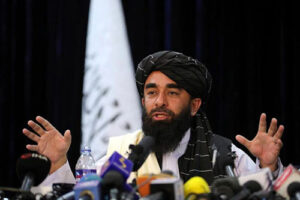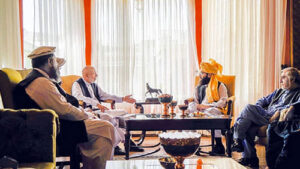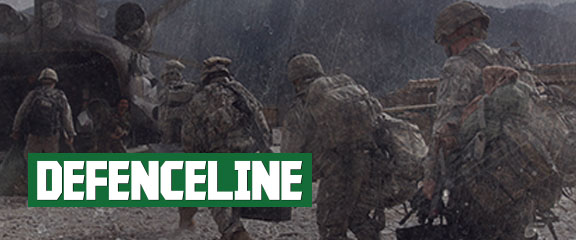Some would offer a simple answer to the question posed: With the situation so fluid in Afghanistan, what should Pakistan do? The pat response, “Wait and pray, keep helping them to communicate with each other to form a broad-based government.” But is that enough? Don’t get me wrong; I am definitely not suggesting poking our nose into their politics or taking sides unnecessarily. Rather, we should immediately assess if there are the space and opportunity to embark upon activities that could bring the two brotherly countries closer in the long run. And our involvement in Afghanistan should rest on the exacerbating plight and the requirements of the people of Afghanistan.
Let us for a moment envisage the different scenarios that could emerge from the present murky situation.

Scenario One (The best among these). Afghans succeed in their endeavours to evolve a broad-based inclusive government, enjoying the support of the majority of the people. And this happens within the next two to three weeks, without use of force or bloodshed. The reasonable and relatively benign attitude displayed by the Taliban when they marched into Kabul regarding the evacuation of foreigners, sticking to their promises regarding reigning in terrorism, a softer stance towards women and girls, and the non-harassment of minorities and political opponents, continues. Next they go on to organise an effective administrative machinery to enforce their writ over the country, seek good relations with neighbouring countries and the world at large, and adhere to well-established international laws, especially to which Afghanistan is a signatory. This would immediately give them recognition by at least a dozen countries, led by Russia and China. Others would also likely follow suit, even if slowly, but the number would keep increasing. Sanctions would be lifted with the passage of time and frozen assets gradually released. In such a scenario, Afghanistan could reap an economic bonanza, changing the entire texture of this country and the region in six to ten years. Apart from Afghanistan itself, China, Russia, Iran, Pakistan, and immediate and distant neighbours could well be the main beneficiaries of this new world order. And then Western countries would likely clamber onboard this success story rather than miss out on the opportunity to also benefit from it, or leave an open field for others.
This, of course, might be too good to be true.
Scenario Two (The worst). The Taliban’s lower tiers and foot soldiers get disgruntled with the delays in forming an acceptable governance arrangement and with the soft behaviour of the leadership towards local political and military opponents and foreign troops trying to extend their stay under various pretexts. Shortages of food and cash incite civil strife and large-scale demonstrations. Local and international detractors take advantage of the situation, and fuel such insurrections, causing the entire country to sink into an abyss of anarchy and bloody feuds. Only a few countries come to their rescue, while the world at large acts as a bystander, rustling up antipathy for the Taliban, yielding an anti-Taliban world movement. Resultantly, an economic resurgence remains a dream, and Afghanistan is back to square one.
This ominous scenario is, however, an unlikely one.
Scenario Three (The Middle Course). Stand-offs between various ethnic and sectarian groups continue to simmer, but do not degenerate into physical skirmishes. However, they continue to delay the formation of an inclusive political set-up. Nevertheless, a semi-inclusive political dispensation generally acceptable to the country’s major ethnic groups is formed, and a working governance set-up is created. Some areas remain restive. Detractors (local and international) keep trying to aggravate the situation, but a strong group of countries led by China, Russia, etc. help in keeping things under control. Not all, but several countries give them recognition. Economic activities take off sluggishly but surely, attracting a measure of interest for investors, thus slowly taking the country out of the current political and economic morass. And so, Afghanistan survives as just another Third World country, and even with frequent political and economic breakdowns, keeps forging on, and remains intact.
This is the most probable scenario, with perhaps some added bits from Scenario One.
Whether it is Scenario One, Three or a combination, Pakistan needs to brace for some immediate activities and many more actions after the formation of a stable Afghan government. Our first and foremost premise should be that we want to deal with a close neighbouring country, not with a political or military faction, even if they are the main stakeholders.

Immediate Undertakings. Our Afghan brothers will soon be facing a difficult situation comprising food scarcity, shortage of hard cash and an absence of experts in various technical and professional fields. Pakistan must rush to alleviate these shortfalls to the best of our capacity. Our geographical bondage, tribal, ethnic, cultural and religious affinities with the Afghans are unlike those with any other country in the world. We just cannot remain unconcerned or unmoved looking at the miseries of our brothers like other bystanders. We need to act, and act fast. Special imports of wheat, sugar, edible oil, pulses and tea should be delivered to Afghanistan on credit. But even before we muster these provisions to send out, a famine-like situation may already be staring Afghans in the face. So initially, we may have to use a portion of our reserve food stocks to send across. This should have started happening yesterday. Other than Chaman and Torkham, we need to arrange for barter trade centres and markets all along the fence wherever we have gates and openings. Small medical centres by the army and other charity organisations should be mobilised and located alongside these bazaars. Our diplomatic and political support in terms of a facilitation of communication and coordination with the international community and internal entities should continue, but only if they so desire. Professionals should be lent on deputation to aid in the fields that the Afghan government desires, and a proper placement bureau needs to be created for this purpose.
Midterm and Longterm Steps. Pakistan may not be an advanced country in terms of technology and professionals, but thankfully we are way ahead of many Third World and poor countries in terms of institutions, professionals in the fields of engineering, medical, IT, commerce, the expertise of our Armed Forces, etc. A large vacuum in all these fields has been created in Afghanistan by the 20 years of misrule, corruption there and the present shift of power. We need to create special task forces to offer help and assistance in such fields whenever a request is made by the Afghan Government. Some of the areas where we could be of immense help are listed below:
- NADRA Services for data management, profiling and identification etc.
- Security and Exchange Commission (SECP) and Stock Exchange experts for laying the foundations of a modern Corporate Sector.
- WAPDA to assist in water and power management and the creation of a similar authority in Afghanistan. The Chairman WAPDA has also suggested the raising of a common Kabul River Management Authority.
- Chemical and Fertiliser Industry expertise be made available.
- Likewise Motorcycle and Automobile manufacturing expertise.
- Aid in the development of a Sugar and Cotton industry.
- Banking and Insurance facilities and expertise. Pakistani banks should immediately open their branches in Afghanistan to facilitate local businessmen.
- Organising, maintaining and training of the Afghan Armed Forces, especially the Air Force.
There are also many other fields we can delve into. A host of these tasks can be performed by the private sector, but the Government of Pakistan needs to launch this enterprise. To this end, a special dedicated ministry should be created to help coordinate all such initiatives at the highest level with promptness and accuracy.
The bottom line: We must move swiftly. There are a host of competitors vying to cash in on all the opportunities offered by the new developments.
We have the highest stake in it. And even more than money, political will is an essential requirement.

The writer is a former defence minister and defence secretary. He has held major command positions in the Pakistan Army.



